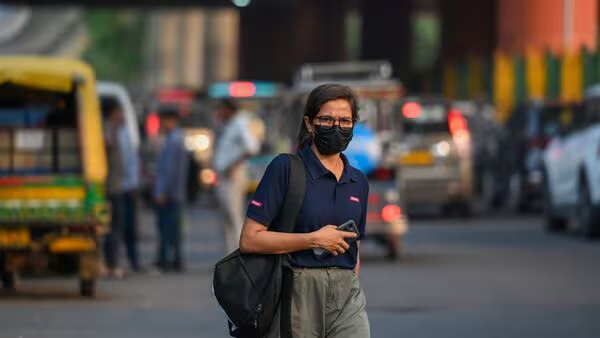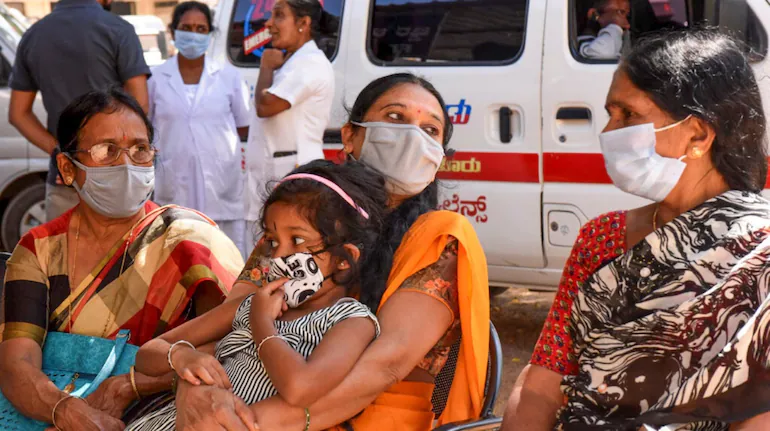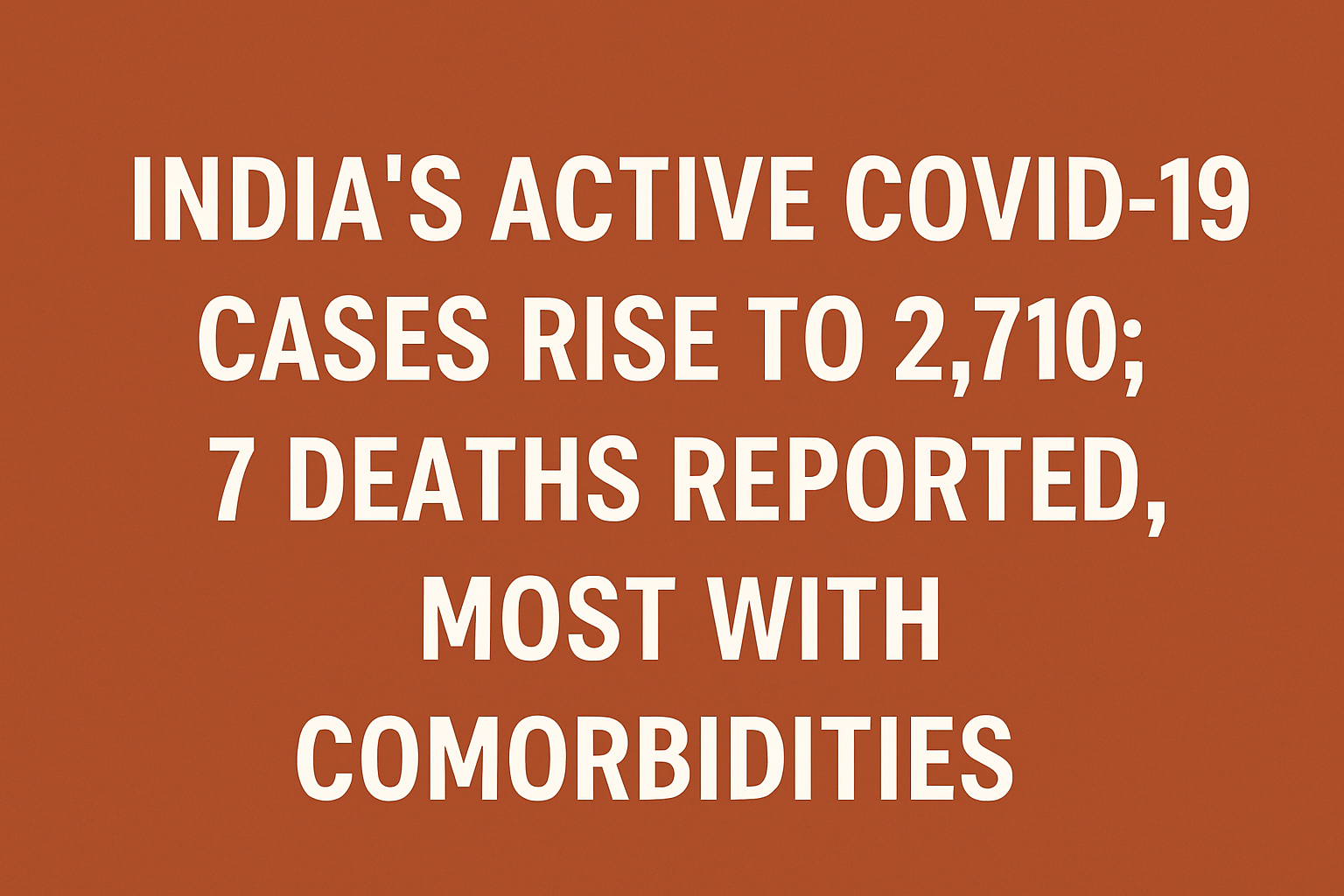
India is once again facing a surge in Covid-19 cases as the number of active infections climbs to 2,710. With seven deaths reported in a short span of time, the alarming rise has put the healthcare sector on high alert. This spike underscores the continuous battle against the virus, reminding citizens to stay vigilant and adhere to precautionary measures.
The Current Scenario
As the nation grapples with the resurgence, health officials have pointed out that a significant number of fatalities were linked to comorbidities. The sudden rise in active cases has reignited concerns about the potential burden on the healthcare system, especially as several regions are still recovering from earlier waves.
States such as Delhi, Maharashtra, and Kerala are witnessing a noticeable uptick in the number of positive cases. Experts attribute this rise to multiple factors, including reduced adherence to Covid-appropriate behavior, waning immunity, and the emergence of newer variants of the virus. Some health analysts have also pointed out that festival gatherings, crowded marketplaces, and the reopening of public spaces without stringent guidelines may have contributed to the spread.
Comorbidities Amplify Risks
Comorbidities such as diabetes, hypertension, and chronic respiratory diseases have been highlighted as major risk factors for severe outcomes in Covid-19 cases. The recent fatalities serve as a grim reminder of how underlying health conditions can exacerbate the impact of the virus. Additionally, certain less-discussed conditions like obesity and autoimmune disorders are being closely studied for their roles in complicating Covid-19 infections.
Healthcare professionals are urging people with such conditions to remain extra cautious. “People with pre-existing medical conditions should ensure timely vaccinations, wear masks in crowded places, and avoid unnecessary exposure,” said Dr. Meena Gupta, a senior epidemiologist. “Simple lifestyle adjustments such as balanced diets, regular exercise, and stress management can also improve overall immunity,” she added.
Vaccination and Booster Campaigns
Vaccination remains one of the most effective tools in the fight against Covid-19. The government has ramped up its booster dose campaigns, targeting vulnerable groups and frontline workers. However, the response to booster doses has been tepid in some areas, largely due to vaccine fatigue and misinformation. In urban areas, younger populations, in particular, appear reluctant to get booster shots, believing the pandemic threat has passed.
Health experts stress the importance of booster shots to bolster immunity, particularly against newer variants. “We need to reinforce the message that vaccines are safe and can significantly reduce the severity of the disease,” added Dr. Gupta. Campaigns are now being tailored to address vaccine hesitancy, with health workers conducting door-to-door visits in rural regions and awareness sessions in schools and community centers.
Testing and Tracking: The Need of the Hour
As active cases surge, the focus has shifted to increased testing and effective tracking of the virus’s spread. Rapid testing centers have been set up in high-risk zones, and authorities are emphasizing the importance of early diagnosis. The recent weeks have also seen a resurgence in the use of home testing kits, which, while convenient, can lead to underreporting if individuals do not inform health authorities of positive results.
Challenges in Testing
While the government has intensified efforts to make testing accessible, challenges persist. Rural areas often lack the infrastructure to carry out large-scale testing. Additionally, the stigma associated with Covid-19 in certain communities continues to deter people from getting tested. In some regions, particularly those with limited literacy levels, misinformation about testing procedures and outcomes has created barriers.
To address these issues, awareness campaigns are being launched to educate the public about the importance of testing and early treatment. Mobile testing units and telemedicine services are also being deployed to bridge the gap in healthcare accessibility. Moreover, partnerships with non-governmental organizations (NGOs) and community leaders are proving effective in disseminating accurate information.
Public Behavior and Preventive Measures
The role of public behavior in controlling the spread of Covid-19 cannot be overstated. Unfortunately, many individuals have become complacent, leading to a decline in the use of masks and adherence to social distancing norms. Public transportation, schools, and shopping malls have become potential hotspots due to lax adherence to protocols.
Reviving Awareness Campaigns
Governments and local authorities are renewing efforts to promote Covid-appropriate behavior. From educational campaigns in schools to stringent enforcement in public places, the aim is to remind citizens that the pandemic is far from over. Public service announcements on television and social media platforms are also being used to reach a wider audience. Innovative approaches, such as leveraging local influencers and community radio stations, are being adopted to make these messages more relatable.
The Role of Technology
Contact tracing apps and digital health tools have played a pivotal role in managing the pandemic. By leveraging technology, authorities can track infections more efficiently and ensure that individuals who test positive are isolated promptly. Continued investment in these digital tools is crucial for staying ahead of potential outbreaks. The use of artificial intelligence and big data analytics is also being explored to predict and preempt local surges, enabling a more proactive approach.
Economic Implications of the Resurgence

The recent spike in cases has also raised concerns about its economic impact. With businesses just beginning to recover from the setbacks of previous waves, another disruption could stall progress. Particularly vulnerable are small and medium-sized enterprises (SMEs) that lack the resources to withstand prolonged periods of reduced activity.
Industries on High Alert
Sectors such as tourism, hospitality, and retail are bracing for the potential fallout. Many companies are revisiting their contingency plans, preparing for scenarios that might require remote operations or reduced workforce capacities. The festive season, which typically drives significant economic activity, has seen subdued consumer confidence in areas experiencing a high number of cases.
Despite these challenges, experts believe that with timely interventions and robust policies, the economic impact can be mitigated. “We must focus on balancing public health priorities with economic stability,” said Arun Sharma, an economist. He emphasized the importance of government relief measures, such as financial assistance to affected sectors and incentives for vaccination campaigns aimed at boosting public confidence.
Looking Ahead: Strengthening the Healthcare System
The current wave serves as a stark reminder of the importance of a resilient healthcare system. Investments in healthcare infrastructure, especially in rural and semi-urban areas, are critical to managing future outbreaks effectively. Hospitals are being urged to update their surge capacity plans, while state governments are working to secure emergency funding for healthcare facilities.
Building Healthcare Capacity
From increasing hospital bed capacities to ensuring a steady supply of medical oxygen and essential drugs, the focus is on preparedness. Training programs for healthcare workers are also being conducted to equip them with the skills needed to handle a surge in cases. Efforts are also being made to improve the mental health support available to frontline workers, many of whom are experiencing burnout after more than two years of battling the pandemic.
Research and Innovation
The role of research in combating Covid-19 cannot be overstated. Ongoing studies on the virus’s behavior, vaccine efficacy, and potential treatments are providing valuable insights. Collaboration between governments, academic institutions, and private organizations is driving innovation, ensuring that the world is better prepared for future challenges.
India’s pharmaceutical sector, known as the “pharmacy of the world,” is ramping up efforts to develop and produce antiviral drugs and vaccines tailored to the Indian population. International collaborations are also being pursued to access cutting-edge technologies and share best practices.
Social and Psychological Dimensions
The resurgence of Covid-19 is not only a public health and economic challenge but also a social and psychological one. Prolonged uncertainty, fear of infection, and the loss of loved ones have taken a toll on mental health across all demographics.
Addressing Mental Health
Mental health experts are advocating for increased access to counseling services and community-based support systems. Online therapy platforms have seen a surge in demand, highlighting the growing need for accessible mental health care. Schools and workplaces are also being encouraged to integrate mental health awareness programs, ensuring that individuals have the tools to cope with stress and anxiety.
The Role of Community Support
Community support has emerged as a powerful tool in managing the social impact of the pandemic. From neighborhood groups organizing food and medicine deliveries for quarantined families to volunteers assisting in vaccination drives, collective efforts are playing a crucial role in mitigating the challenges posed by the virus.
Conclusion
The resurgence of Covid-19 cases in India is a sobering reminder that the fight against the virus is far from over. With 2,710 active cases and seven deaths, the emphasis must remain on vaccination, testing, and adherence to preventive measures. Public cooperation and robust healthcare policies will be key to navigating this challenging phase. By staying informed and vigilant, India can overcome this resurgence and move towards a safer and healthier future. Strengthening the healthcare system, promoting scientific research, and fostering a spirit of community resilience are essential steps in this journey. Together, we can ensure that the lessons learned from this pandemic pave the way for a more prepared and united response in the years to come.

